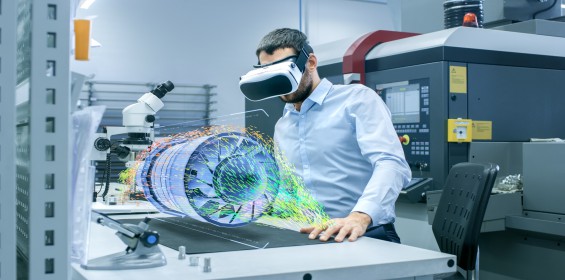Digital innovation supporting jobs
Published: 07 December, 2020
Increased adoption of new digital technology has underpinned businesses’ response to COVID-19, with four in ten citing it as both vital to retaining jobs, and the ongoing viability of their business model, according to a new report from the University of Liverpool.
Entitled A blueprint for digitally driven recovery from COVID-19, it is based on a survey of North West business leaders from a range of sectors, exploring the drivers behind this increased use, and the barriers to adoption many have overcome.
The Russell group University’s industry-facing digital innovation teams also make recommendations in the report on where to begin when formulating a digital strategy, and how to harness new drivers presented by the pandemic to spark wider, long-term transformation.
Crucially, more than half of businesses which have invested in new digital technology during the pandemic have already seen a return on investment. Controlling for video conferencing, which the report’s authors acknowledge was ubiquitous during 2020, it found almost 80% of businesses have increased investment in digital technology in direct response to COVID-19. A quarter have made major digitally-led changes to the way their business operates.
Almost half of businesses are using more Internet of Things devices and sensors, with many employing these technologies to reduce human foot traffic in laboratories, manufacturing facilities and supply lines, to adhere to social distancing requirements. Around a third are now using more augmented, virtual or extended reality to support multiple use cases; including sales, research and development, and onboarding new staff. Around 10 per cent bolstered existing business models, or developed new products and services, using artificial intelligence, digital twins, additive manufacturing or 3D printing.
Of the technologies businesses were most interested in adopting in the future, data analytics came top, with 20% recognising its potential.
Despite the rapid return on investment and vital ability to protect jobs and business models, however, one in four businesses cited a lack of understanding and not knowing where to start as a barrier to adoption for emergent digital technologies. More than half recognised that failing to invest was a major risk to their business’ long-term viability.
Dr Andrew Levers, executive director, Institute of Digital Engineering and Autonomous Systems at the University of Liverpool, said: “Few businesses have been left unchanged by COVID-19. One constant between those which have weathered these challenging months effectively, and others which have scaled quickly to capitalise on new demand and markets, has been the effective adoption of digital technology.
“The University’s industry-facing teams within the Virtual Engineering Centre, and the Materials Innovation Factory, have been working with businesses to demystify and de-risk emerging technology for the last decade. Demand for this support has markedly intensified during the pandemic as digital transformation has been mandated for many.
“In 2020, new drivers, including safety, regulatory compliance and, for many businesses, the very ability to keep operating, have joined the long-standing factors of productivity and efficiency which have traditionally underpinned interest in digital innovation. These new drivers present a more compelling imperative to act, and businesses are harnessing them to catalyse adoption. In doing so, many are not only charting a recovery through COVID-19; they are sparking a wider digital transformation and securing a sustainable competitive advantage for the long-term.”
Councillor David Baines, leader of St Helens Council and Portfolio Holder for Digital Connectivity and Inclusion at the Combined Authority, added: “The University of Liverpool’s white paper is highly timely and especially welcome. Not just because it has been produced at the height of the 2nd wave of the Covid-19 pandemic in the UK, but also as its findings will influence and be incorporated into the Liverpool City Region’s first ever Digital Strategy and Action Plan, to be published in early 2021.
“In turn, this reflects the close partnership between the Combined Authority and our universities, as well as with industry and other stakeholders; the hallmark of the LCR innovation ecosystem and our approach to maximising our competitive advantages to unlock growth.
“The fact that the vast majority of businesses, large and small, intend to continue to adopt, adapt and innovate using digital technologies over the next 12 months clearly illustrates that accelerated digitalisation is here to stay, and how vital this can be to short and medium term economic recovery as well as longer term growth.”
The University of Liverpool’s industry-facing digital innovation offer is led by the Virtual Engineering Centre (VEC) and the Materials Innovation Factory – two of the University’s most successful hubs of industry-academic collaboration.
It helps businesses accelerate product development, reduce cost and risk in R&D, and collaborate with world-leading academics, with an ‘industry-first’ approach, to move with the pace and agility which commercial research and development demands.
Staffed by experienced ex-industry executives and world-leading academics, the service offers frictionless access to cutting-edge technology and laboratory equipment. This removes the barriers to emergent R&D equipment that SMEs would be unable to afford, and which larger corporates may be hesitant to invest in.
The offer will be complemented by the launch of the new Digital Innovation Facility (DIF), next year. Based in Liverpool’s Knowledge Quarter, DIF is a £12.7million investment co-funded by the Liverpool City Region Combined Authority, which will provide a new home for world-leading academic research dedicated to maximising the real world impact of emerging technologies.
For more information on the University of Liverpool’s digital innovation offer, please visit www.liverpool.ac.uk/digital-innovation.
https://www.linkedin.com/school/university-of-liverpool/?originalSubdomain=zw







